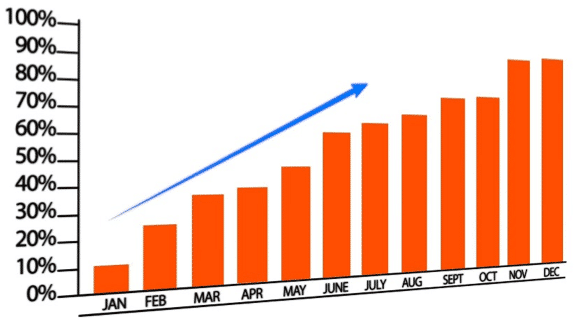Do you feel ready to take the IELTS Test? Practice will allow you to go into the test with confidence and peace of mind. Spend time on each of the 4 tests, so that you’ll be able to recognize their structure, and feel relaxed on the day of the exam. Here, we’ll focus on the IELTS Writing test.
We’ll look at:
- The structure of the writing test and its evaluation criteria
- Some examples of exercises
- A few tips for passing the test
- How to train with GlobalExam.
Let’s learn everything about the IELTS Writing test. All aboard!
How Is the IELTS Exam Writing Section Structured?
The IELTS test is divided into 4 sections: Listening, Reading, Writing and Speaking. The Writing section of the IELTS exam lasts one hour and it consists of two parts:
- Task 1, in which you must write a minimum of 150 words
- Task 2, in which you must write at least 250 words.
You should allow yourself 20 minutes to complete Task 1 and 40 minutes to complete Task 2.
The texts that you need to write will be different, depending on the version of the test you take.
| Academic | General | |
|---|---|---|
| Task 1 (150 Words) | Describe a Graph or Diagram | Write a Letter |
| Task 2 (250 Words) | Write an Essay | Write an Essay |
IELTS Writing Academic Task 1: Presentation and Instructions
On IELTS Academic Writing Task 1, you’ll be asked to write at least 150 words to describe a graph, table, chart or process using formal language. You’ll be given information and asked to write about the main features of the data and describe them in appropriate detail. You are also invited to make comparisons where relevant.
You only need to report on the factual information contained in the graph. You do not need to interpret the data, make speculations or explain possible reasons for the trends in the data. You’ll have 20 minutes for this task.
Here is an example of a graph:

IELTS Writing Academic Task 2: Presentation and Instructions
For the Task 2 of IELTS Academic Writing you’ll be asked to write an essay in response to a point of view, argument or problem. Your essay should be at least 250 words, and in a formal style. Aim to complete the essay in under 40 minutes.
Example task 2:
Write about the following topic:
A person’s worth nowadays seems to be judged according to social status and material possessions. Old-fashioned values, such as honour, kindness and trust, no longer seem important. To what extent do you agree or disagree with this opinion? Give reasons for your answer and include any relevant examples from your own knowledge or experience.
Write at least 250 words.
IELTS General Writing Task 1: Presentation and Instructions
In the IELTS General Writing section you must write a letter asking for information or explaining a situation. You’ll need to write at least 150 words. Depending on the task suggested, candidates are assessed on their ability to give and justify an opinion, discuss a topic or problem, summarise details, and give arguments and examples. You will be directed to write to a specific person, who could be a friend, a colleague, or someone in an official position.
Aim to spend about 20 minutes on Task 1.
Example task:
A friend has agreed to look after your house and pet while you are on holiday. Write a letter to your friend.
In your letter
- Give contact details for when you are away
- Give instructions about how to care for your pet
- Describe other household duties
Write at least 150 words. You do NOT need to write any addresses.
Begin your letter as follows:
Dear …………………,
If you wish to pratice for the IELTS General Traing Writing task 1 , we provide exercises online. We also offer test preparation for the General Writing task 2.
IELTS General Writing Task 2: Presentation and Instructions
You’ll be given a topic. You’ll need to give and justify an opinion, discuss the topic and summarise details. You’ll need to give reasons, arguments and examples. You are also encouraged to make use of your own knowledge or experience.
Aim to complete the essay in under 40 minutes.
Example task:
Some people believe that teaching children at home is best for a child’s development while others think that it is important for children to go to school.
Discuss the advantages of both methods and give your own opinion. Give reasons for your answer and include any relevant examples from your own knowledge or experience.
Write at least 250 words.
Top 5 Tips & Strategies for the IELTS Writing Test
Here are some tips to help you a little bit more:
1. Understand the question.
You need to understand the question before you answer it. Make sure you understand what type of question it is, and any keywords in the question. Finally, identify the instructions words. This will help you understand exactly what the examiner wants you to do.
2. Plan your answer.
Plan your answers for up to 10 minutes. This will help you organise your ideas, and structure what you write before you write it. You’ll save yourself time and produce a clearer letter or essay.
3. Write an introduction.
The introduction should tell the examiner/reader what the letter or essay is about and also answer the question directly. This tells the examiner that you know what you are doing straight away and helps you write your main body paragraphs.
4. Use explanations and relevant examples.
Support your arguments with examples. Use examples when giving more details on a topic, problem or solution.
5. Write a conclusion.
Write a conclusion to provide a summary of what you already said in the rest of your letter or essay.
How Does the Scoring Work for Task 1 And Task 2 of the IELTS Writing Section?
The examiner will mark your writing with reference to very strict criteria which are divided into four categories. For IELTS Academic Task 1 and Task 2, three of the criteria are the same: Coherence and Cohesion, Lexical Resource, Grammatical Range and Accuracy.
1. Coherence and cohesion
This criterion is about how your text is organised.
Is there a logical progression from the beginning to the end? Do you use paragraphs correctly ? Are your sentences well connected and can you link ideas? Do you use a lot of repetition?
2. Lexical Resource
This criterion is about the variety of words you use. Do you only use common words or do you use words that are related to specific topics or situations?
Do you use words in the appropriate context? Are you aware of how certain words are used together, for example “make a suggestion” rather than “do a suggestion”? Do you spell words correctly?
3. Grammatical Range and Accuracy
This criterion is measured by the variety of grammatical structures you use. Can you use complex structures such as conditionals, modal verbs, past tenses and the passive? Or do you use simple structures such as present tenses? Do you make many grammatical errors?
4. Specific Criteria for Task 1 and Task 2
a. Task 1 Criterion: Task Achievement
For Task 1 you will also be graded on Task Achievement. For General Training this means making sure that the purpose of the letter is clear, addressing all the points and writing in an appropriate tone. For the IELTS Academic Writing Training, this means how successfully you present a clear overview. It shows how you select and explain relevant information from the graph.
b. Task 2 Criterion: Task Response
In Task 2 you will receive a score for Task Response, this is an evaluation of how well you respond to the question or statement presented to you. You need to give a developed response to all the parts of the question, offer a clear opinion and a range of ideas that are supported by relevant examples.
For both Task Achievement and Task Response, word count is also an important factor. If your text is too short, this will reduce your band score.
How Is Your IELTS Writing Section Band Score Calculated?
You are given a band score for each criteria, the maximum band score you can achieve is 9. The criteria are all equally important. If you score 5 for both Grammatical Range and Lexical Resource, and band 6 for both Task Achievement and Cohesion and Coherence, your final band for Task 1 will be an average of the four scores, Band 5.5.
IELTS Writing Task 1
In the table below, IELTS Academic Training is referred to as AT and the General as G.
| 9 | fully satisfies all the requirements of the task and clearly presents a fully developed response | uses cohesion in such a way that it attracts no attention |
| 8 | covers all requirements of the task sufficiently and presents, highlights and illustrates key features/ bullet points clearly | sequences information and ideas logically |
| 7 | covers the requirements of the task but could be more fully extended (A) presents a clear overview of main trends, differences or stages (GT) presents a clear purpose, with the tone consistent and appropriate | uses a range of cohesive devices correctly although there may be some under-/over-use |
| 6 | presents and adequately highlights key features/ bullet points but details may be irrelevant, not appropriate or inaccurate (A) presents an overview with the correct information selected (GT) presents a purpose that is generally clear; there may be inconsistent in tone | uses cohesive devices effectively, but cohesion within and/or between sentences may be faulty or mechanical and may not always use referencing clearly |
| 5 | presents, but not coverd, key features/ bullet points; there may be a tendency to focus on details (A) recounts detail mechanically with no clear overview; there may be no data to support the description (GT) may present a purpose for the letter that is unclear at times; the tone may be variable and sometimes not appropriate | presents information with some organization but there may be a lack of overall progression and makes inadequate, inaccurate or over-use of cohesive devices |
| 9 | uses a wide range of words with very natural and sophisticated control of lexical features | uses a wide range of structures with full flexibility and accuracy |
| 8 | uses a wide range of words fluently and flexibly to convey precise meanings but produces rare errors in spelling and/or word formation | uses a wide range of structures and makes only very occasional errors |
| 7 | uses a sufficient range of words to allow some flexibility and precision but may produce occasional errors in word choice, spelling and/or word formation | produces frequent error-free sentences and has good control of grammar and punctuation but may make a few errors |
| 6 | attempts to use less common terms and makes some errors in spelling and/or word formation, but they do not impede communication | uses a mix of simple and complex sentence forms but makes some errors in grammar and punctuation which rarely reduce communication |
| 5 | uses a limited range of words, but this is minimally adequate for the task and may make noticeable errors in spelling and/or word formation that may cause some difficulty for the reader | uses only a limited range of structures and may make frequent grammatical errors and punctuation may be faulty; errors can cause some difficulty for the reader |
Source: https://www.ielts.org/-/media/pdfs/writing-band-descriptors-task-1.ashx?la=en
IELTS Writing Task 2
| 9 | fully addresses all parts of the task and presents a fully developed position in answer to the question with relevant, fully extended and well supported ideas | uses cohesion in such a way that it attracts no attention |
| 8 | sufficiently addresses all parts of the task and resents a developed response to the question with relevant, extended and supported ideas | sequences information and ideas logically |
| 7 | addresses all parts of the task and presents, extends and supports main ideas, but there may be a tendency to extrapolate and/or supporting ideas may lack focus | uses a range of cohesive devices appropriately although there may be some under-/over-use |
| 6 | addresses all parts of the task although some parts may be more fully covered than others and presents a relevant position although the conclusions may become unclear or repetitive | uses cohesive devices effectively, but cohesion within and/or between sentences may be faulty or mechanical and may not always use referencing clearly or appropriately |
| 5 | addresses the task only partially; the format may be not appropriate in places and presents some main ideas but these are limited and not sufficiently developed | presents information with some organization but there may be a lack of overall progression and makes inadequate, inaccurate or over-use of cohesive devices |
| 9 | uses a wide range of terms with very natural and sophisticated control of lexical features | uses a wide range of structures with full flexibility and accuracy |
| 8 | uses a wide range of terms fluently and flexibly to convey precise meanings but produces rare errors in spelling and/or word formation | uses a wide range of structures and makes only very occasional errors or not appropriate uses |
| 7 | uses a sufficient range of phrases to allow some flexibility and precision but may produce occasional errors in word choice, spelling and/or word formation | produces frequent error-free sentences and has good control of grammar and punctuation but may make a few errors |
| 6 | attempts to use less common phrases but with some mistakes and makes some errors in spelling and/or word formation, but they do not impede communication | uses a mix of simple and complex sentence forms but makes some errors in grammar and punctuation which rarely reduce communication |
| 5 | uses a limited range of words, but this is minimally adequate for the task and may make noticeable errors in spelling and/or word formation that may cause some difficulty for the reader | uses only a limited range of structures and may make frequent grammatical errors and punctuation may be faulty; errors can cause some difficulty for the reader |
Source : https://www.ielts.org/-/media/pdfs/writing-band-descriptors-task-2.ashx?la=en
How Can GlobalExam Help You Prepare For the IELTS Test?
On the GlobalExam platform you can prepare for Task 1 and Task 2 of the Writing section of the Academic exam. Although some of the Task 2 questions will also be suitable for practice of the General Training.
Other tools are also at your disposal to help you in your revisions.
- We give you access to grammar and lexical review sheets.
- In addition, with our Statistics and Corrections mode, you can not only follow your progress throughout your training, but also identify your strengths and weaknesses.
- Finally, our Personalized Courses allow you to set goals to reach before the big day
- We also have an article giving you IELTS Writing Tips to succed your exam
GlobalExam gives you access to IELTS writing sample questions which are graded from easy to difficult. You can submit your own answers and have them graded by a teacher. The questions are also accompanied by a model answer, as well as model essay plans and key language to improve your writing skills.
To access the free version you could simply register to our platform. You will then be able to take a complete practice test for free. We also offer a Premium version if you want to have access to more exercises. Check online and find the IELTS test center location nearest to you.



